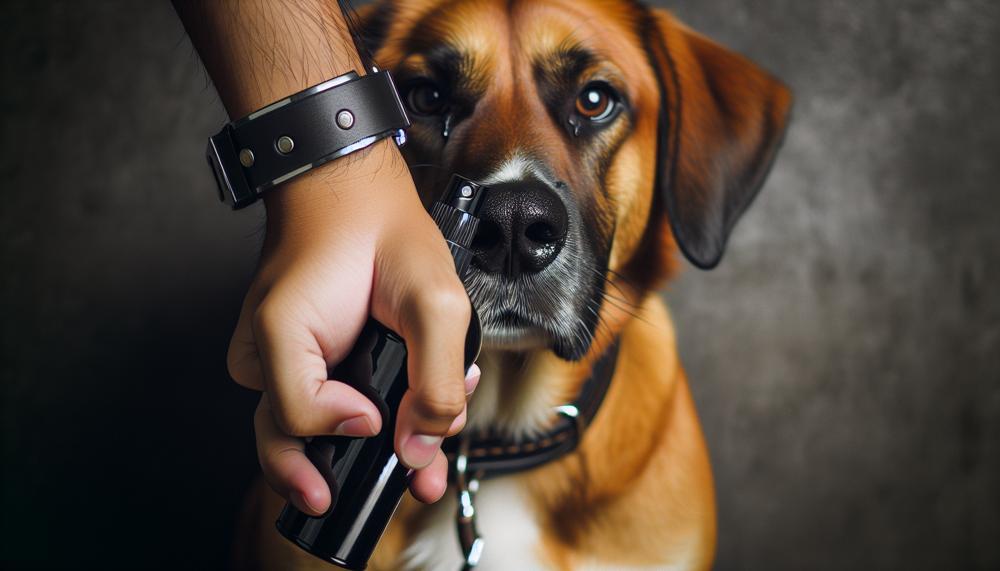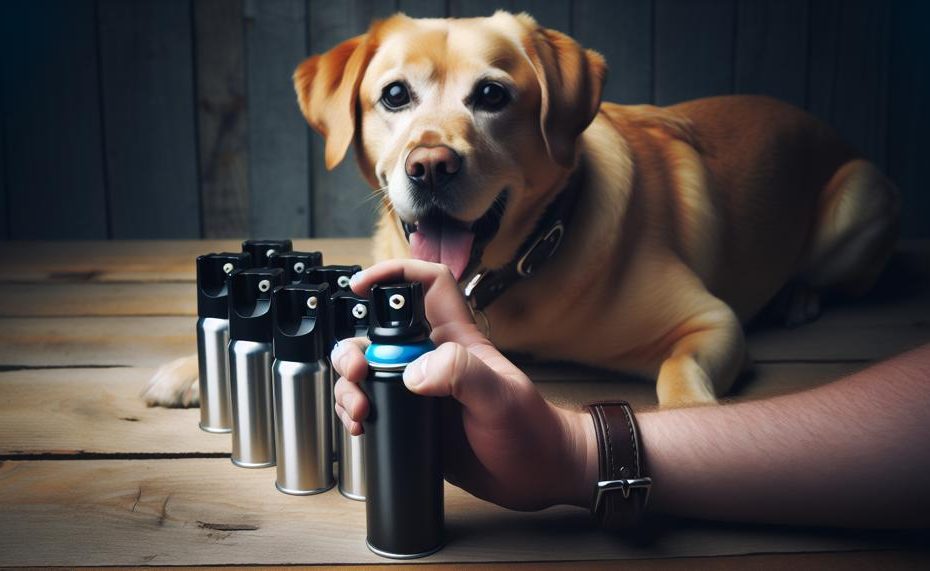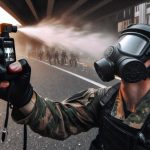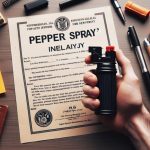Imagine this: you’re taking a leisurely stroll with your beloved furry companion, reveling in the fresh air and warm sunshine. Suddenly, a stranger appears out of nowhere and unleashes pepper spray on your unsuspecting dog. Your heart races as you watch your loyal friend yelp in pain and confusion. You feel powerless and enraged, unsure of what to do or how to react.
Unfortunately, incidents like this are all too common nowadays. With the growing number of dog owners and outdoor activities, encounters with aggressive individuals who use pepper spray on dogs are becoming increasingly frequent. It’s a frightening thought for any pet parent, but it’s crucial to know how to handle such a situation if it ever arises.
In this blog post, we’ll delve into the steps you can take to protect your canine companion and yourself when confronted with someone who has pepper sprayed your furry family member.
From understanding the effects of pepper spray on dogs to taking legal action, here are some vital points to keep in mind when dealing with this unfortunate scenario:
- Stay calm and assess the situation – don’t let fear cloud your judgment
- Wash off the pepper spray immediately – every second counts
- Seek medical attention for your dog if necessary – their health is top priority
- Gather evidence and file a police report – hold the perpetrator accountable
- Consider taking legal action against the assailant – justice must be served
Don’t let panic paralyze you in such a critical moment – read on to discover how to handle this type of emergency like a seasoned pro.
Contents
- 1 What To Do If Someone Pepper Sprayed My Dog?
- 2 What to do if someone pepper sprayed your dog: Immediate steps
- 3 Moving your dog away from the area and avoiding further exposure
- 4 Providing relief for your dog’s discomfort: Flushing out the pepper spray
- 5 Assessing your dog’s condition and seeking veterinary attention if necessary
- 6 Washing and cleaning your dog to remove any remaining traces of pepper spray
- 7 Creating a safe and comfortable space for your dog to rest and recover
- 8 Conclusion
What To Do If Someone Pepper Sprayed My Dog?
To ensure your dog’s safety from pepper spray, it is crucial to:
- Stay vigilant and avoid areas where pepper spray may be used, such as protests or demonstrations.
- Train your dog to come to you when called in case of an emergency or potential exposure to pepper spray.
- Use a leash or harness when walking your dog to maintain control and prevent them from wandering off into potentially dangerous situations.
If your dog accidentally gets exposed to pepper spray, follow these steps:
- Stay calm and move your dog away from the area where they were sprayed.
- Rinse their face, mouth, and eyes with large amounts of water or cold running water for 10-15 minutes.
- Check for any spray on other parts of their body and rinse with water as well.
- Contact your veterinarian immediately if your dog ingests pepper spray or if the eye or skin irritation persists.
- Keep a close watch on your dog’s condition and provide a safe and comfortable environment for them to rest and recover.
- If necessary, seek professional veterinary attention for further treatment and medication.
What to do if someone pepper sprayed your dog: Immediate steps
If someone pepper sprays your dog, it’s important to stay calm and take immediate action. The first step is to carefully move your dog away from the affected area. Then, you should quickly flush their eyes and nose with clean water to minimize the impact of the pepper spray.
Pepper spray is a chemical derived from chili plants that can cause severe pain and temporary blindness when in contact with the eyes or skin. This chemical triggers an immediate response from the body, causing the eyes to close, coughing, and tearing up. The effects of pepper spray can last for at least 30 minutes, depending on the strength and amount used.
When dealing with pepper spray exposure in dogs, it’s crucial to act quickly and efficiently. The longer the chemical stays on your dog’s skin or coat, the more severe the effects can be. Therefore, it’s essential to take immediate steps to alleviate their discomfort.
To ensure the safety and well-being of your dog, follow these steps:
- Remain Calm: It’s understandable that seeing your beloved furry friend in pain can be distressing. However, remaining calm is crucial in this situation as your dog can sense your emotions. Panicking or getting agitated can cause them to become anxious or fearful.
- Move Your Dog Away: Carefully pick up your dog and move them away from the affected area. This step is vital as it prevents further exposure to the pepper spray.
- Flush Their Eyes and Nose: Using clean water, gently flush your dog’s eyes and nose to remove any residual pepper spray. You can use a hose or a gentle stream of water from a tap or container.
- Seek Veterinary Assistance: If your dog’s symptoms persist or worsen after following these immediate steps, seek veterinary assistance immediately. A professional will be able to provide further treatment and ensure no long-term effects.
Remember that prevention is always better than cure. To avoid any potential exposure to pepper spray, keep your dog on a leash when in public and avoid situations that may put them at risk of harm.
Moving your dog away from the area and avoiding further exposure
If your dog has been hit with pepper spray, it’s crucial to safely move them away from the area and prevent any further exposure. Follow these steps to ensure your furry friend is taken care of:
- Stay calm and assess the situation.
- Carefully relocate your dog to a safe and open area.
- Avoid touching the affected area to prevent spreading the spray.
- Use a clean towel or cloth to wipe away any excess spray.
- Rinse the affected area with lukewarm water to help neutralize the chemicals.
- Wash your dog’s fur with a mild soap or pet-friendly shampoo to remove any remaining residue.
- Gently dry your dog’s fur with a clean towel.
- Take preventative measures to avoid any further exposure, such as using a cone or pet-safe ointment.
- Keep an eye on your dog for any signs of distress or discomfort.
- If necessary, seek veterinary care for your dog’s well-being.
Providing relief for your dog’s discomfort: Flushing out the pepper spray
When it comes to flushing out pepper spray from your dog’s eyes and skin, remaining calm and using proper cleansing techniques is crucial. It’s important to remember that rubbing or touching the affected area can further irritate the skin and worsen the symptoms. Instead, use a non-oil-based soap to gently cleanse the area and remove any traces of the pepper spray.
But what if the symptoms persist? Seeking medical attention may be necessary in these cases. A trained medical professional can properly assess your dog’s condition and provide additional treatment if needed. This can include administering eye drops or ointments to soothe the discomfort and promote healing.
In order to avoid exposure to pepper spray in the future, taking preventative measures is key. This can include avoiding areas where pepper spray may be used, such as during protests or in self-defense situations. If you do find yourself in a potentially dangerous situation, try to create distance between yourself and the source of the pepper spray as quickly as possible.
Remember, staying calm and following proper techniques is essential when dealing with pepper spray on your dog.
Assessing your dog’s condition and seeking veterinary attention if necessary
If your furry friend is displaying signs such as uncontrollable fits of sneezing, persistent coughing, and excessive rubbing of their eyes and nose, it is possible that they have come into contact with pepper spray. It is crucial to act promptly and wash the affected area with cool water. If the symptoms continue or your dog is having severe reactions, it is imperative to seek veterinary care without delay.
Having your beloved pooch experience pepper spray’s effects can be a distressing situation for any pet owner. The intensity of the pain and discomfort caused by this chemical compound can vary depending on the amount and strength used. However, it typically causes temporary blindness and extreme discomfort that can last for up to 30 minutes.
In such a situation, your priority should be to ensure that your dog is safe and comfortable. Begin by washing off the pepper spray residue from their face with cool water, paying extra attention to their eyes, nose, and mouth. This will help alleviate some of the pain and discomfort they may be experiencing.
While most dogs will recover from pepper spray exposure with minimal intervention, some may experience more severe reactions. If you notice that your dog’s symptoms are not improving or seem to be getting worse, it is essential to seek professional veterinary care immediately.
A veterinarian will be able to assess your dog’s condition accurately and provide appropriate treatment to ease their discomfort.

Washing and cleaning your dog to remove any remaining traces of pepper spray
Cleaning and washing your dog after exposure to pepper spray may seem intimidating, but it is crucial for their overall well-being. Here are some tips to help you navigate this challenging task:
Rinse the affected area with cool water
The first step in removing pepper spray from your furry friend is to rinse the affected area with cool water. This will help to flush out any excess spray and ease some of the discomfort they may be feeling.
Use a hose or a cup of water to carefully clean off their fur, face, mouth, and eyes.
Seek medical attention if symptoms persist
If your dog continues to squint or excessively tear up, it is essential to seek medical attention.
The surface of their eyes may have been harmed, and they may need medication or further treatment.
Use a mild, fragrance-free shampoo
After rinsing, use a mild, fragrance-free shampoo to cleanse their fur and skin. This will help to eliminate any remaining capsaicin residue from the pepper spray. Be sure to thoroughly lather and rinse the affected areas.
Be gentle and patient with your dog
During this process, it’s crucial to handle your dog with care and remain calm.
They may be in pain or distress, so it’s important to be gentle and reassuring. If needed, ask someone else to hold your dog while you wash them.
Keep an eye out for any adverse reactions
After washing and cleaning your dog, monitor them for any unusual behavior or reactions.
If you notice anything out of the ordinary, consult your veterinarian immediately.
| Step | Instructions | Important Considerations |
| 1 | Rinse affected area with cool water | Carefully use hose or cup of water to clean off fur, face, mouth, and eyes |
| 2 | Seek medical attention if symptoms persist | Excessive squinting or tearing may indicate eye damage and require medication or treatment |
| 3 | Use a mild, fragrance-free shampoo | Thoroughly lather and rinse affected areas to remove capsaicin residue |
| 4 | Be gentle and patient with your dog | Dog may be in pain or distress, handle with care and seek help if needed |
| 5 | Monitor for adverse reactions | If any unusual behavior or reactions occur, consult veterinarian immediately |
Creating a safe and comfortable space for your dog to rest and recover
After seeking medical attention, it is crucial to provide your dog with a safe and comfortable space to rest and recover. This will not only help reduce their discomfort, but also promote faster healing. Here are some important steps you can take to create such a space for your furry friend:
- Remove them from the source of the pepper spray: Take your dog to a quiet and well-ventilated area away from where they were exposed to the pepper spray. This will limit their further exposure and allow them to relax without any distractions.
- Offer fresh water and bland food: Due to the intense thirst caused by pepper spray, make sure to provide your dog with plenty of fresh water. You can also give them some bland food like boiled chicken or rice to help settle their stomach.
- Keep them away from heat sources: Pepper spray can cause inflammation and irritation, which can worsen with heat. To alleviate their discomfort, keep your dog in a cool and shaded area.
- Apply a cool compress: To soothe your dog’s irritated skin, you can use a cool compress on the affected areas. Simply take a damp cloth or towel soaked in cold water and gently apply it to their skin for a few minutes at a time.
- Consider natural remedies: Aloe vera gel or coconut oil can be helpful in reducing inflammation and promoting healing on your dog’s skin.
- Create a calm environment: Loud noises and excessive activity can agitate your dog and prolong their recovery. It is important to keep the space as peaceful as possible to help them relax and heal.
- Monitor closely and show love: Being pepper sprayed can be a traumatic experience for dogs, so it is crucial to monitor them closely and provide extra love and attention during this time.
Remember, each dog may have a different reaction to pepper spray, so it is essential to pay close attention to their needs and seek veterinary care if necessary.
Also Read: Can You Be Immune To Pepper Spray?
Conclusion
In conclusion, encountering a situation where someone has pepper sprayed your dog can be a terrifying and overwhelming experience. It is crucial to remain calm and take swift action to protect your beloved furry companion. From understanding the effects of pepper spray on dogs to taking legal measures, there are important steps to keep in mind when dealing with this unfortunate scenario.
Vigilance is key – avoid areas where pepper spray may be used and train your dog to come to you in an emergency. Additionally, always use a leash or harness when walking them for added safety. If your dog does come into contact with pepper spray, swiftly move them away from the area and rinse their eyes, nose, and body with water. Seeking medical attention may also be necessary depending on the severity of the exposure.
Consider taking legal action against the assailant as well, as they have caused harm not only to your dog but also to you as their owner. By following these steps and prioritizing your dog’s well-being, you can minimize the impact of pepper spray and ensure their speedy recovery.





